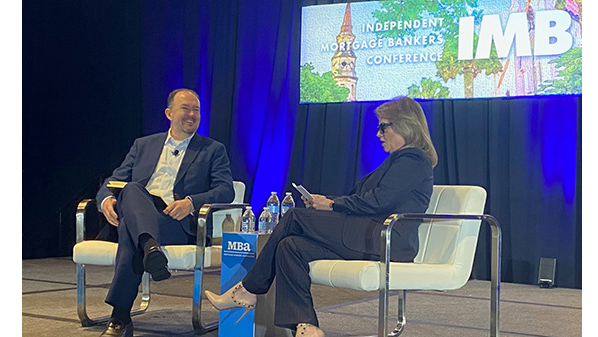
Fannie Mae’s Tim McCallum Discusses 2024 Expectations: #MBAIMB24

((l to r) Tim McCallum from Fannie Mae being interviewed by Laura Escobar, 2024 MBA Chair-Elect
and President of Lennar Mortgage)
NEW ORLEANS–Tim McCallum, senior vice president and head of single-family business account management at Fannie Mae, sees more optimism in the market today than in recent months.
“Talking to people here this week, there’s a positivity, a sense of optimism that may not have existed in the last 18 months,” McCallum said here at MBA’s Independent Mortgage Bankers Conference. “So that kind of translates into how we’re thinking about things as well. We recently upgraded our 2024 forecast and took the thought of a recession off the table.”
McCallum said Fannie Mae anticipates mortgage sales and originations will pick up due to the lowering rate environment over the course of this year. “But I think the headwinds that we see still come back to affordability,” he noted. “There are high prices, high demand and low supply. When you look at it from that perspective, I don’t want to say that we have any tailwind behind us as we go into 2024, but I think the headwinds have been dramatically reduced over where they’ve been.”
Laura Escobar, 2024 MBA Chair-Elect and President of Lennar Mortgage, noted that dropping rates could mean a surge in refinances. “This is very important, as borrowers try to lower their monthly payments,” she said. “While lenders are helping to make homes more affordable and sustainable through refinances, it could turn into early payoffs and prepayment speeds. What are your thoughts on this dynamic? And does Fannie Mae have any concerns related to the potential market shift?”
McCallum noted some form of an increased refi market happens during every cycle. “From that perspective, I think Fannie Mae is always concerned about prepay speeds; prepay speeds directly correlate to our investor base and they’re also a requirement of ours to manage inside of Uniform Mortgage-Backed Securities. Prepayment speeds are something that we look at in aggregate across the industry; when there are outliers we handle those one-off issues with specific lenders that may have tried to churn their portfolio or their speeds are up or for another reason such as their book is getting picked off.”
McCallum cited a Morgan Stanley study that found that 74% of mortgages in the United States have a note rate below four percent. “So if you think about that, and where rates are projected to drop to, it would take a substantially larger rate drop to cause any real form of prepay spike in the general market considering the amount of borrowers that would be ‘in the money’,” he said.
Escobar asked if Fannie Mae has any plans to rethink the positions or the portions of the QC process given the focus seen on repurchases and rep and warrant framework over the last 12 to 18 months.
“We absolutely do,” McCallum replied. “First, I’d like to say we do not intend to replicate the Freddie Mac pilot, but we would like to commend them for that innovation and we’re very interested in the learnings.” [Freddie Mac recently announced a pilot program that could replace the current approach to seeking repurchases for performing loans with origination defects.]
“From our seat and the way we think about repurchases going forward, we believe–it may be aspirational, but I don’t know if this is as aspirational as it is going to sound–we believe we can get to a point through technology, through the use of Generative AI, and through adoption of our additional tools that we are able to deploy into the market, that when you sell us a loan, there won’t be a repurchase on that loan outside of potential charter violations or fraud that wouldn’t be found until the later date and time,” McCallum said.
On Wednesday Fannie Mae announced an enhancement to its HomeReady program to temporarily offer a $2,500 LLPA credit to address some of the barriers to entry for very low-income borrowers.
